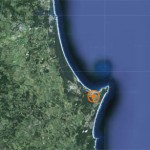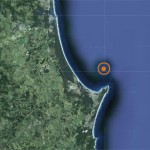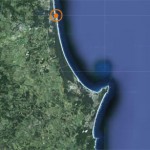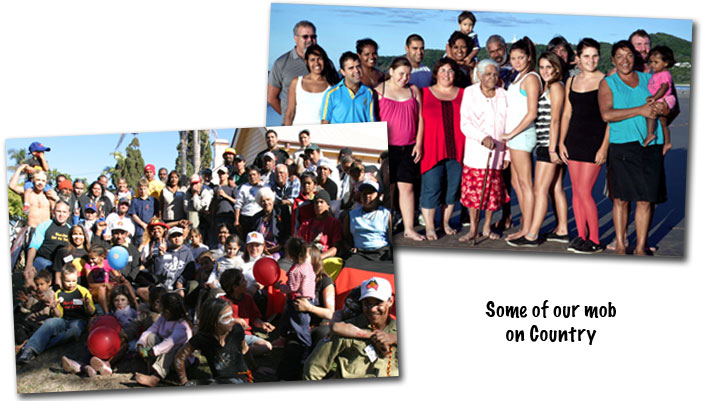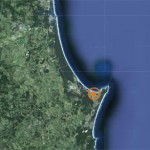 Cavanbah, which means ‘meeting place’, with its sweeping beachfront and sheltered places was a favourite home base and meeting place for the Arakwal people and other Bunjalung nation tribes.
Cavanbah, which means ‘meeting place’, with its sweeping beachfront and sheltered places was a favourite home base and meeting place for the Arakwal people and other Bunjalung nation tribes.
Log in and Connect with Us! Click here and Sign-in as a Friend to receive newsletters on line and updates. If you are one of the Arakwal Mob, or want to become a Colleague you can apply for access and then use the Log-In area of the Menu.
Navigating the Site: It easy just click on the Menu to the left and start exploring! We encourage you to start with our Welcome to Country and then go from there. You can read on to find out more about what is on the website, and how to move around it using the Menu.
Do you work in the fields of cultural education and community development related to Aboriginal communities, or represent another Aboriginal or First Nation community? If so you might want to apply to become one of our colleagues. By providing some information about who you are, and type of work, research and activity you are engaged in, we can consider your application.
If you a have a general enquiry, comment or question please contact us. It may take us a little time to get back to you depending on what we are involved in, so please be patient. Thanks!.
Arakwal Aboriginal Corp. Office: 02 6685 8746
If you a have a general enquiry, comment or question please contact us. It may take us a little time to get back to you depending on what we are involved in so please be patient. Thanks!
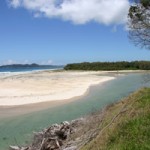 The following Learning Materials for Back to Country are available for download. Click Learn More below to find out more about this program.
The following Learning Materials for Back to Country are available for download. Click Learn More below to find out more about this program.
No materials are online presently. In the next phase of developing this website we will upload and create links to resource materials related to this program if they exist such as:
- Link Here eg. Program outline PDFs, background information.
- Link Here eg. to relevant external website(s)
- Link Here eg. to purchase product(s) such as DVDs if available.
If you have any enquiries about this program please liaise with us through Contact Us > General Enquiry in the Menu.
Our website is a place for us to share our culture and passion for Country with you. It’s for our Mob, wherever you are, for learning and to keep connected as a community, sharing our challenges and belonging. It’s for our friends and colleagues to keep in touch, supporting and helping us in what we are doing. It’s for everyone else who is interested in us and our stories, our creative arts and love of Country. The following sections show you how to explore the website, and how to connect with us.
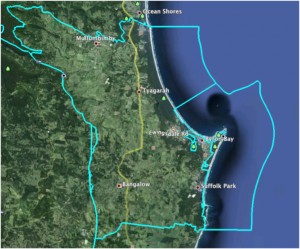 Our mob, the Bundjalung of Byron Bay – Arakwal Bumberlin people, have lived in the coastal landscape around the Byron Bay area for at least 22,000 years. We are one of over 500 Aboriginal tribes that co-habited Australia before European occupation. We are the recognised Aboriginal Traditional Custodians of the Byron Bay district. Arakwal Country extends from Seven Mile Beach south of Broken Head to the Brunswick River up north, out to the escarpment west of Byron Bay, and east out into the Tasman Sea. Click map to see a larger one.
Our mob, the Bundjalung of Byron Bay – Arakwal Bumberlin people, have lived in the coastal landscape around the Byron Bay area for at least 22,000 years. We are one of over 500 Aboriginal tribes that co-habited Australia before European occupation. We are the recognised Aboriginal Traditional Custodians of the Byron Bay district. Arakwal Country extends from Seven Mile Beach south of Broken Head to the Brunswick River up north, out to the escarpment west of Byron Bay, and east out into the Tasman Sea. Click map to see a larger one.
Arakwal people lived in this area for thousands of years before the arrival of non-Aboriginal people. Our families continued to live here when non-Aboriginal people moved into the area, often under great pressure, and finding it more difficult to live on, and look after our traditional lands.
We are proud to have been able to survive the challenges so far along with other Aboriginal people in Australia. We really appreciate people who understand this struggle and support us in our efforts. Yoway!
Around and beyond this area, Country is looked after by other Aboriginal traditional owners with which we have had close and interconnected relations for a long time. Byron Bay (Cavenbah) has always been an important meeting place for the Arakwal, neighbouring clans and people of the Bundjalung nation. Our people, together with neighbouring tribes and clans, make up part of the wider Bundjalung Nation. This nation extends to Grafton and the mighty Clarence River in the south, up north past Tweed River to the Nerang River in southern Queensland, and out west towards the Great Dividing Range.
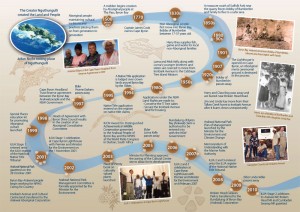 Our timeline Check out this timeline that gives you an idea of what has been happening for us, and shows some of our family connections to this country. It goes from a long time back right up until recently … it shows the connection we’ve had with this place long before the coming of Europeans and others, including well-known seafarer, Captain James Cook. And we are still working away at looking after and reconnecting our people with their place. The timeline is part of a pamphlet prepared by the NSW Office of Environment & Heritage.
Our timeline Check out this timeline that gives you an idea of what has been happening for us, and shows some of our family connections to this country. It goes from a long time back right up until recently … it shows the connection we’ve had with this place long before the coming of Europeans and others, including well-known seafarer, Captain James Cook. And we are still working away at looking after and reconnecting our people with their place. The timeline is part of a pamphlet prepared by the NSW Office of Environment & Heritage.
Click here to download a PDF of the Timeline Pamphlet
Since 2001 the Arakwal people have entered into three Indigenous Land Use Agreements with the New South Wales Government recognising our rights as Traditional Owners to lands and waters in and around Byron Bay within this area. Click here to read more.
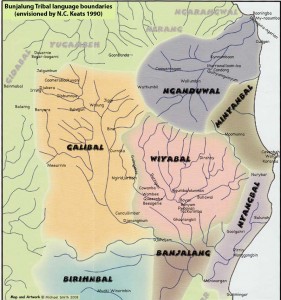 Our ancestors have passed on traditions and cultural practices that are alive in us, their descendants, today. We retain a strong connection to our country, actively caring for and reconnecting our people to this place. We share our knowledge and culture with the wider community to help look after Country.
Our ancestors have passed on traditions and cultural practices that are alive in us, their descendants, today. We retain a strong connection to our country, actively caring for and reconnecting our people to this place. We share our knowledge and culture with the wider community to help look after Country.
This Country and our language dialect corresponds closely to the language group Minyanbal on the Bundjalung tribal language area map here. Our language is at times referred to as Arakwal-Minyanbal. Click on the map here to see a larger version.
Our Corporation
The Bundjalung of Byron Bay Aboriginal Corporation (Arakwal) was established in 1996. Its members are our people. Strengthening our Aboriginal identity and culture, and ensuring our efforts accord with our cultural values, customs and practices are a major focus of the organisation. The corporation works in partnership with government, community groups, and business enterprises to protect and help manage the land and waters of our traditional Country, and to benefit our community through improved housing, health and wellbeing, and training and work opportunities. We focus on:
- Living and Working back on Country - including indigenous resource and co-management agreements; dealing with Native Title matters; reviewing land-use plans, strategies and development proposals; involvement in Land and Coastcare activities; working and caring for Arakwal National Park and the Cape Byron Marine Park; developing affordable housing for our community.
- Maintaining Cultural Connection to Country - including revitalisation of cultural practices, developing and running cultural programs for our people and the wider community, as well as reconciliation activities and events.
- Business and economic development – including education, training and employment strategies, developing and supporting businesses and work for our people, housing and better services for our elders and community.
We want everyone to respect, appreciate and value Arakwal Country. We invite you to stand with us to protect and support our values, understanding how we belong to Country, respecting and helping us care for Country.
“We want to see Country how it used to be. We want to continue to look after country and want it to look after us. We want our people to be back on Country, caring for and using Country like we always have. We want to share parts of our culture with the wider community so they learn about and respect Country like we do. We want everybody to work together to keep Country clean and healthy.”
Aunties Lorna Kelly, Dulcie Nicholls and Linda Vidler, 2003.
Bottlenose Dolphin (Tursiops aduncus) is an important totem for our people. Wajoong gives us messages about relationships between our clan members, to our ancestors and the past, and also to particular places and sites in our Country. We have stories of our people and dolphins communicating and connecting with each other, including co-operative fishing, sharing resources from the ocean, and playing in the shallows. Sea Eagle (Miwing)
White Breasted Sea Eagle (Haliaetus leucogaster) is an important totem for us. Miwing gives us messages about clan and family groups, provides knowledge on hunting practices and environmental events on Country. The second largest raptor (bird of prey), you can see the majestic Miwing soaring above you as you walk along Tallow Beach or around the Cape. Carpet Snake (Kabul)
Carpet Snake (Morelia spilota) as one of our key totems symbolises the relationship of clan members to each other, to our ancestors and the past, and to particular places or sites. Kabul are important to us for their conservation, wild resource and other cultural values. Brush Turkey (Wollum)
Brush Turkey (Alectura lathami) is a messenger providing clues about and demonstrating knowledge and adaptability in knowing and using Country. Wollum lives and moves freely in the coastal bush, foraging through leaf litter for food to eat. The male builds large mounds out of vegetative material and uses it to incubate their eggs. Pied Oystercatcher (language name?)
Pied Oystercatcher (Haematopus longirostris) is an important bird to us because they provide messages about food sources and environmental events in Country. The Pied forages on the beaches and rocky shores, in mudflats of inlets, bays, ocean beaches, and on offshore islets. Green Turtle (Bijahlin)
Green Turtle (Chelonia mydas) is an important messenger that provides knowledge of the sea Country. Biwing nests on north coast beaches including Tallow Beach and Lennox Heads to the south. Julian Rocks (Nguthungulli) supports significant populations of the Biwing and if you go snorkeling or diving there, you can have a close encounter with these graceful creatures.
 NAIDOC Week 2016
NAIDOC Week 2016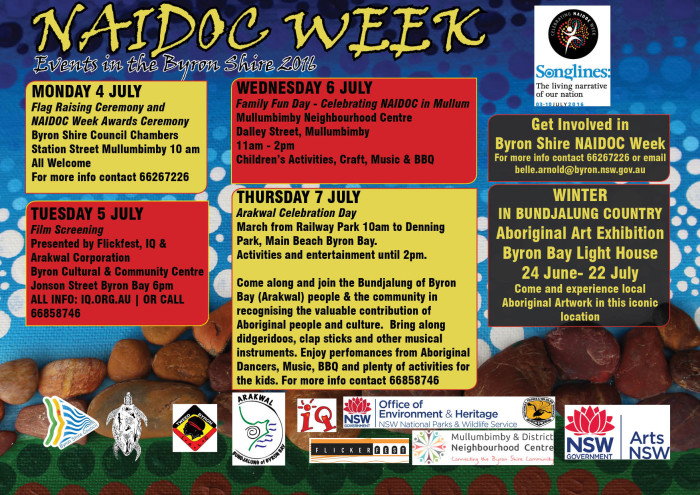 NAIDOC Program
NAIDOC Program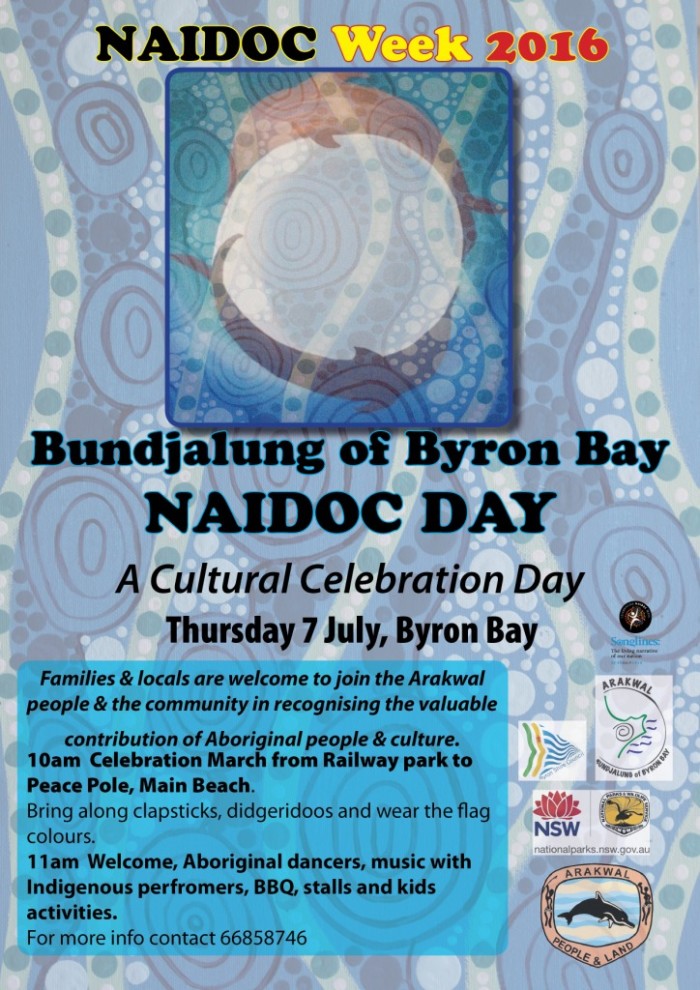 Cultural Celebration
Cultural Celebration